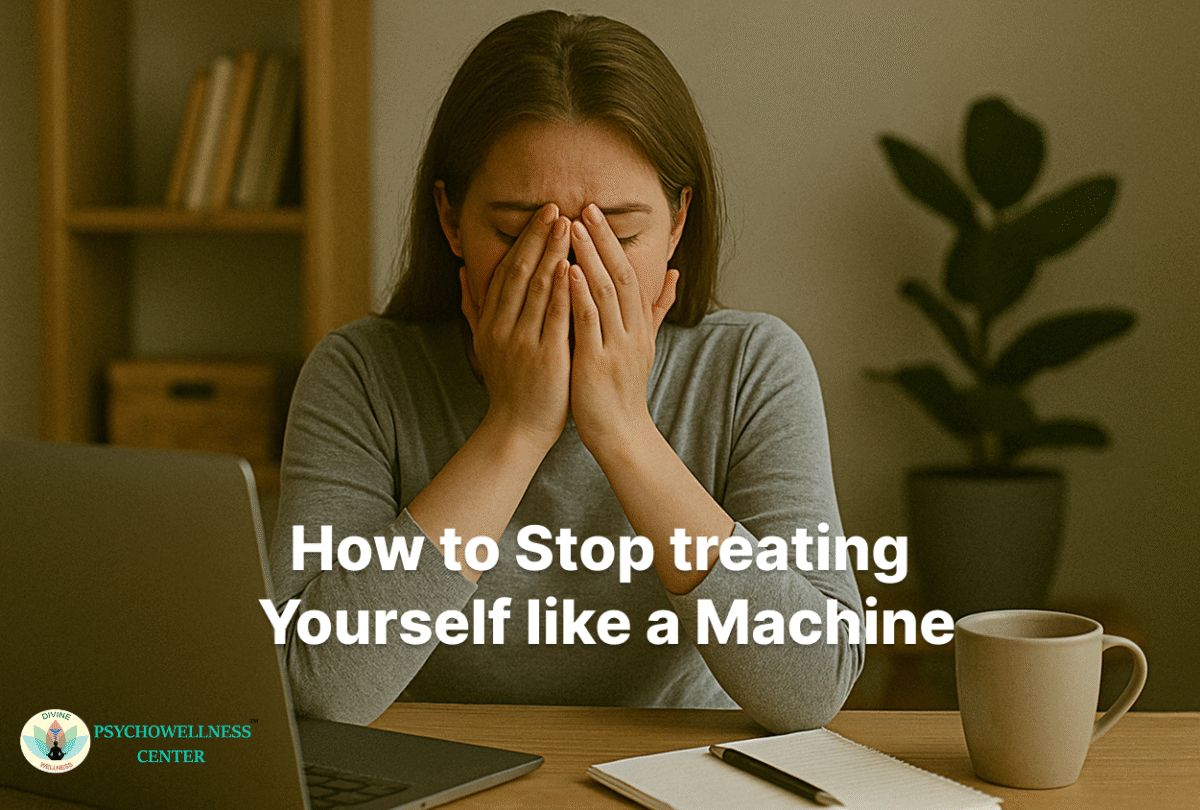In the fast-forward loop of modern life, many of us have unknowingly slipped into a lifestyle that feels more mechanical than meaningful. Our days are spent racing from one obligation to the next, checking tasks off digital to-do lists, answering pings, and measuring our worth by how much we can accomplish in a single day. We wake, work, power through, crash, and repeat. There’s hardly any space left for calm, presence, or real joy. We’ve been conditioned to believe that slowing down is risky—that success lies in doing more, pushing harder, and powering through exhaustion. But that’s not truly living. It’s surviving.
Are You Stuck in Machine Mode?
The pattern doesn’t announce itself loudly. These are the quiet signs that you might be operating on autopilot:
- Doing nothing feels wrong. Idleness makes you uneasy. Rest feels undeserved.
- You ignore your physical signals—skipping meals, staying up late, and running on empty becomes a badge of honour.
- Emotionally, you feel flat. Joy, sadness, and even excitement seem dulled.
- Your mood rises and falls with your accomplishments. If you’re not producing, you feel guilty.
- You rely on caffeine or sugar not for pleasure, but to stay functional.
- Your schedule is overbooked, and spontaneity feels unsafe.
Living this way doesn’t just change how you manage your time—it slowly reshapes how you see yourself.
What Drives This Way of Living?
It’s not just a personal flaw or lack of balance—it’s a deeply ingrained cultural script. We live in a world that idolises hustle. Busyness is seen as a badge of honour, and the ability to work non-stop is celebrated, while taking breaks is mistaken for laziness.
From childhood, many of us were taught that we’re “good” when we’re helpful, high-achieving, or obedient. Over time, we began linking our value with our performance. This leads to fragile self-esteem, where feeling worthy depends on external success.
Add to that the ever-present pull of technology—emails, messages, updates. We’re constantly “on,” which overwhelms our nervous systems and amplifies everyday stress. Stillness can be scary, too. It brings up difficult thoughts and buried emotions, so staying busy becomes a way to avoid discomfort.
The Emotional and Physical Toll
Living like a machine eventually wears down even the strongest among us. Your physical health may suffer. You might notice rising blood pressure, fatigue, or even signs of hypertension. Emotionally, your spark starts to dim. Life feels grey. Even the things you once loved bring little joy. Relationships start to fray. Exhaustion makes you irritable or emotionally absent. You might withdraw or lash out unexpectedly due to unprocessed anger. Over time, loneliness seeps in. Disconnection from yourself leads to disconnection from others. Your creativity slows. There’s no room for ideas or imagination when you’re stuck in survival mode.
The Mental Health Connection
Prolonged pressure often leads to deeper emotional challenges:
- A lingering sense of low motivation, where everything feels like a struggle.
- Inner turmoil driven by guilt, burnout, and comparison.
- A creeping sense of FOMO, where no amount of achievement feels like “enough.”
- For some, it even surfaces as a midlife crisis—a moment of reckoning where life feels both full and hollow at the same time.
If any of these resonate with you, it’s not a weakness. It’s a call to reconnect with yourself, with rest, and with support.
The Power of Support and Reconnection
One powerful way to reverse this pattern is through stress counselling, which can help unpack the layers of over-functioning and teach healthier coping strategies.
Approaches like motivational interviewing can also guide you in understanding your values, reigniting purpose, and building sustainable change—from the inside out.
Reclaiming Your Humanity: Small Shifts with Big Impact
Here’s how to start your return to yourself:
- Pause and notice. Ask yourself: How do I feel right now? It’s a simple but profound reconnection.
- Protect your rest. Sleep isn’t earned—it’s essential. Schedule breaks without apology.
- Honour your body’s signals. Eat when hungry. Rest when tired. Tune in.
- Let go of perfection. Showing up at 70% some days is enough.
- Draw boundaries. Define when work ends. Turn off notifications. Make room for presence.
- Rediscover joy. Play, create, dance—do things just for fun, not for performance.
Be kind to yourself. Replace internal criticism with compassion. You’re not a machine—you’re a person.
Conclusion
Breaking free from machine mode is a brave act in a world that glorifies burnout. It asks you to slow down, soften, and start treating yourself like someone who matters—because you do.
- You are not your job title.
- You are not your output.
- You are not your calendar.
You are a living, breathing human being—and that’s more than enough. Take the first step toward a more balanced and fulfilling life by booking a consultation at the Psychowellness Center, located in Janakpuri or Dwarka, by calling 011-47039812 or 7827208707. For those seeking the convenience of online therapy tailored to emotional concerns, you can also explore therapy through the TalktoAngel platform.
Contributed by Ms. Riya Rathi, Counselling Psychologist
References
- Newport, C. (2016). Deep work: Rules for focused success in a distracted world. Grand Central Publishing.
- Peters, T. (2021). Rest is resistance: A manifesto. The Nap Ministry.
- Petersen, A. H. (2021). Can’t even: How millennials became the burnout generation. Mariner Books.
- Van Der Kolk, B. (2014). The body keeps the score: Brain, mind, and body in the healing of trauma. Viking.

